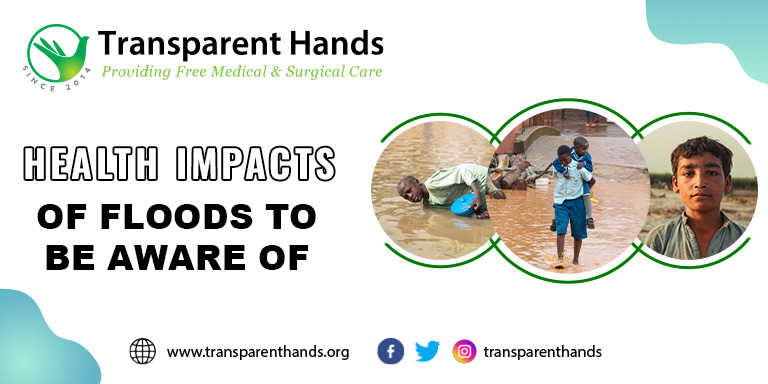Health Impacts of Floods to Be Aware Of

Floods are natural disaster that takes place when a region is overwhelmed by an excess of water. Floods can occur due to natural causes, such as heavy rainfall or snowmelt, or human-made reasons, such as dam failures or levee breaches. The health impacts of floods are always accompanied by devastating consequences on infrastructure. However, in this article, we will discuss the health impacts on individuals and communities.
Contamination of Water and Food
One of the most significant health impacts of floods is the contamination of water sources and food supplies. Floodwater can carry dangerous pathogens, chemicals, and other hazardous substances that can cause illnesses such as diarrhea, cholera, typhoid fever, and hepatitis A. The contamination of food supplies can also lead to food poisoning and other fatal illnesses like cholera.
Drowning
Drowning is another major health impact of floods. Floodwaters can be fast-moving and dangerous, and individuals caught in them can easily get swept away or trapped. Children and the elderly are particularly vulnerable to drowning during floods. According to the World Health Organization, drowning is responsible for 7% of all deaths due to natural disasters.
Injuries
Floods can also cause various injuries to individuals. People may slip and fall in the flooded areas, which can result in broken bones or other serious injuries. In addition, the risk of electrocution is high in flooded areas due to damaged electrical wires and equipment. Injuries can be particularly severe during rescue operations, which involve exposure to fast-moving water and unstable debris.
Mental Health Impacts
Floods can also have long-lasting impacts on individuals’ mental health. People who experience floods may suffer from depression, anxiety, post-traumatic stress disorder, and other related illnesses. The trauma of losing their homes, possessions, and loved ones can have a severe and long-lasting impact on individuals’ mental health.
Infectious Diseases
Floods can increase the risk of infectious diseases due to poor sanitation and hygiene conditions. The risk of waterborne diseases such as cholera, typhoid fever, and hepatitis A is high in flooded areas due to the contamination of water sources. Vector-borne diseases such as malaria and dengue fever can also increase due to the proliferation of mosquitoes in flooded areas.
Common Diseases in Flood-affected Areas
Respiratory Problems
Floods can also lead to respiratory problems. Mold and mildew can grow in damp environments, such as flooded homes, which can cause respiratory problems such as asthma and bronchitis. In addition, the high levels of humidity in flooded areas can exacerbate respiratory problems.
Conclusion
Floods have severe and long-lasting health impacts on individuals and communities. The contamination of water and food supplies, drowning, injuries, mental health impacts, infectious diseases, and respiratory problems are some of the significant health impacts of floods. In addition to these, floods can also cause economic losses and social disruption. Therefore, it is crucial to take necessary precautions and measures to prevent and mitigate the impacts of floods on human life and infrastructure.










Leave Your Comments